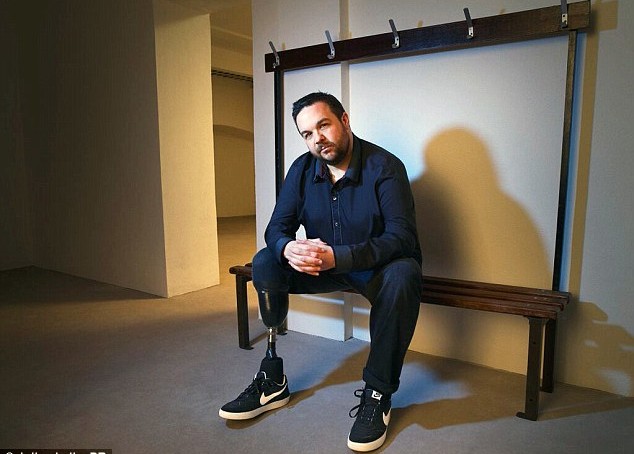The series of events that led to the amputation of Colin Leggo’s leg began in characteristic fashion: he was dressed up as an elf at the time, preparing to star in a children’s show. Like most things the stand-up comedian gets involved with, even this very dark chapter has hidden depths of funny.
“I was playing an elf,” says Colin. “My plastic shoes didn’t fit and I developed a blister on the little toe of my right foot. By the end of the week the blister hadn’t healed and I’d developed flu-like symptoms. Then I woke one morning and my foot had swollen and turned bright purple.”
That was back in 2004. Eventually, Colin went to his local hospital, St. George’s in Tooting, South-West London, where the specialist asked him: “So how long have you had diabetes?”
As far as 36-year-old Colin knew, he hadn’t. But blood tests placed his glucose levels at around 30; the kind of levels considered seriously risky.
His diagnosis was a shock, but type 1 diabetes explained a lot. A few years ago, he had weighed 14st, despite being only 5’9. Recently, however, the weight had been dropping off him.
“I’d lost a lot of weight over the previous two years without trying. And when I was diagnosed, I weighed just over 8st. When I first lost weight, I was pleased. In fact, it made me adopt a healthier diet and do regular exercise – I’d put my continued weight loss down to that.”

Colin spent a month in hospital while doctors controlled the infection. Unfortunately, “controlling” involved cutting away much of the flesh on the side of his foot, including his little toe and the big bone attached to it.
Things get worse for Colin
But mistakes were made: too much flesh was cut away. Colin couldn’t stand up properly because of a lost tendon. The skin blistered while his leg was in a cast. He had to wear a splint for years. Then Colin had a metal device attached to his leg via 16 bolts, which had to be altered manually to turn his foot.
And yet, despite the increasingly bizarre, slightly torture-device treatments dreamed up to fix Colin’s leg, he didn’t get better. Nothing worked. Colin had to make a choice: have the leg amputated, or draw out the treatment even further.
“I couldn’t wear normal shoes, run, swim or go on holiday without complicated planning. I’d had enough…I agreed to the operation.”
“After three days, the dressing had to be changed and that’s when I steeled myself to meet my stump. It was gruesome: red, swollen, covered in stitches. But I knew it would calm down in time.”
After amputation
Colin is a lot happier with his new titanium leg than he was before the amputation. For the first time in nearly ten years, he can walk with minimal fuss, and without any help at all.
“We’re just pleased I’m no longer battling a foot that was basically dying. And I’m so much happier because I haven’t got this constant threat of infection and pain.”
For Colin, the whole ordeal underlines the importance of early diagnosis for people with diabetes:
“I’ve sometimes asked myself whether amputation would have been necessary if I’d been diagnosed earlier and I’m pretty certain it wouldn’t have been. But you can’t live your life on what might have been.”
The importance of foot care
And the story certainly highlights the need for good foot care. A recent study found that 135 people a week need amputations as a result of diabetes. Most of these cases will start from small injuries or wounds that the person won’t feel because of diabetic neuropathy (nerve damage), which then won’t heal because diabetes causes wounds to heal more slowly. It’s vital, then, that people with diabetes check their own feet, as well as attending annual foot checks with their GP.
Colin, resourceful comedian that he is, has turned his experiences into comedy. He’s written a whole show about his amputation, and he’s taken it to the Edinburgh Fringe Festival. He sees the funny side, as did a nurse who spoke to him shortly after his operation:
“She looked at me and started laughing,” says Colin. “‘Mr. Leg Go. Did the surgeon see your name and chop your leg off?’ I’m not sure of material.”
Source: adapted from Dailymail.co.uk.






